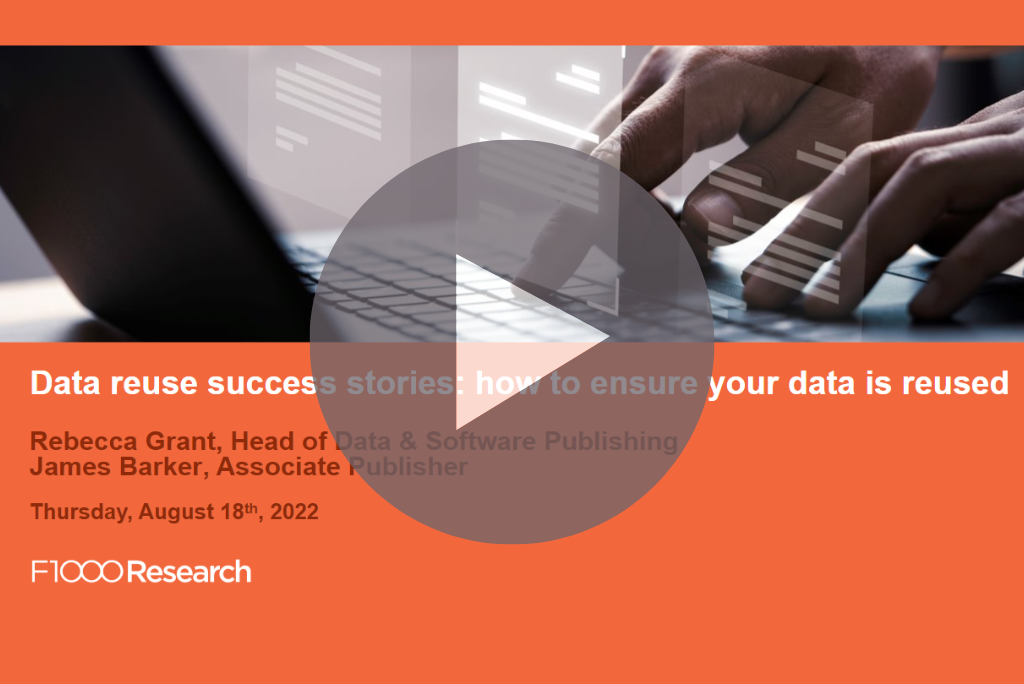Just published your Research Article?
Why stop there?
Effective data sharing extends beyond simply depositing your dataset in a repository. At F1000Research, we believe that data should be shared in a discoverable, useable and reproducible way.
Enter: Data Notes.
Data Notes are short descriptions of a dataset indicating why and how the data was collected. Unlike a traditional Research Article, Data Notes do not include any analyses or conclusions. Rather, they cover the following:
Dataset rationale, protocol, and validation details
Information about any limitations of the dataset
Information on where and how to access the dataset, as part of a Data Availability Statement
Reference to the dataset using a formal data citation
Data Notes are suitable for all kinds of data no matter the subject or the size of the dataset. Furthermore, as with any F1000Research article, Data Notes are ‘living’, meaning you can come back and update your article with new findings at any time.
The benefits of publishing a Data Note
Quick and easy to write
The aim of a Data Note is to describe your dataset. Therefore, no analyses or conclusions are required, making Data Notes quick and easy to write.
Improve research reproducibility
Reproducibility is essential to good science. Data Notes let you share contextual information about your scientific datasets, enabling others to easily use your dataset and analysis to achieve the same results; demonstrating that your research results are objective and reliable.
Increase the visibility of your research
Data Notes are fully citable stand-alone articles with their own DOI. This gives your data its own bibliometric flag meaning that readers, such as those searching through PubMed, can discover and cite your research more easily.
Minimize research waste
If you have data that you couldn’t analyze during your study, whether that be because it was unexpected or because it may have been out of scope for your Research Article, you can make it available via a Data Note. This provides you with an additional citable output for work you have already completed.
Promote innovation and potential new data uses
Data sharing allows researchers to build upon the work of others rather than repeat already existing research. This allows researchers to dedicate more time and resources to identifying new and unforeseen data uses.
Foster new collaborations
By publishing a Data Note, you can increase the visibility of your research, opening up opportunities to discover new connections for collaborative research
Comply with funder and institutional open data policies
Many funders and institutions require researchers to preserve and share their research data. Publishing a Data Note with F1000Research can help you meet these requirements as it helps to preserve your data whilst also enhancing the quality of your metadata. Additionally, like all publications on F1000Research, Data Notes are immediately published open access.
Featured Articles
Draft genome sequencing of the sugarcane hybrid SP80-3280
Riaño-Pachón DM and Mattiello L.
Read the article
Identification of highly specific antibodies for Serine/threonine-protein kinase TBK1 for use in immunoblot, immunoprecipitation and immunofluorescence
Alshafie W, Fotouhi M, Shlaifer I et al.
Read the article
Data set of a representative online survey on search engines with a focus on search engine optimization (SEO): a cross-sectional study
Schultheiß S and Lewandowski D.
Read the article
High-risk human-caused pathogen exposure events from 1975-2016
Manheim D and Lewis G.
Read the article
Curation of an intensive care research dataset from routinely collected patient data in an NHS trust
McWilliams C, Inoue J, Wadey P et al.
Read the article
Ribosome profiling of HEK293T cells overexpressing codon optimized coagulation factor IX
Alexaki A, Kames J, Hettiarachchi GK et al.
Read the article
Discover more from F1000Research

Join our community
Sign up for our mailing list and be the first to know about the latest content, news, calls for papers, and more.

Explore our earth and environmental science Gateways
We have a number of earth and environmental sciences Gateways, each of which are dedicated to the open and transparent discussion of some of the world’s most critical environmental issues.



